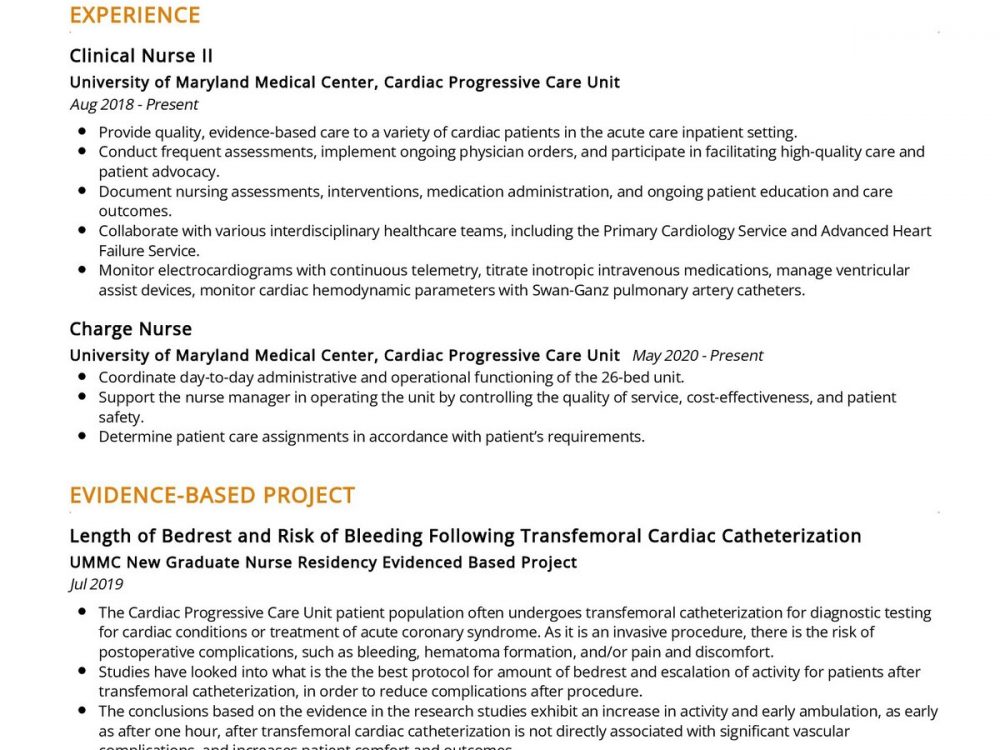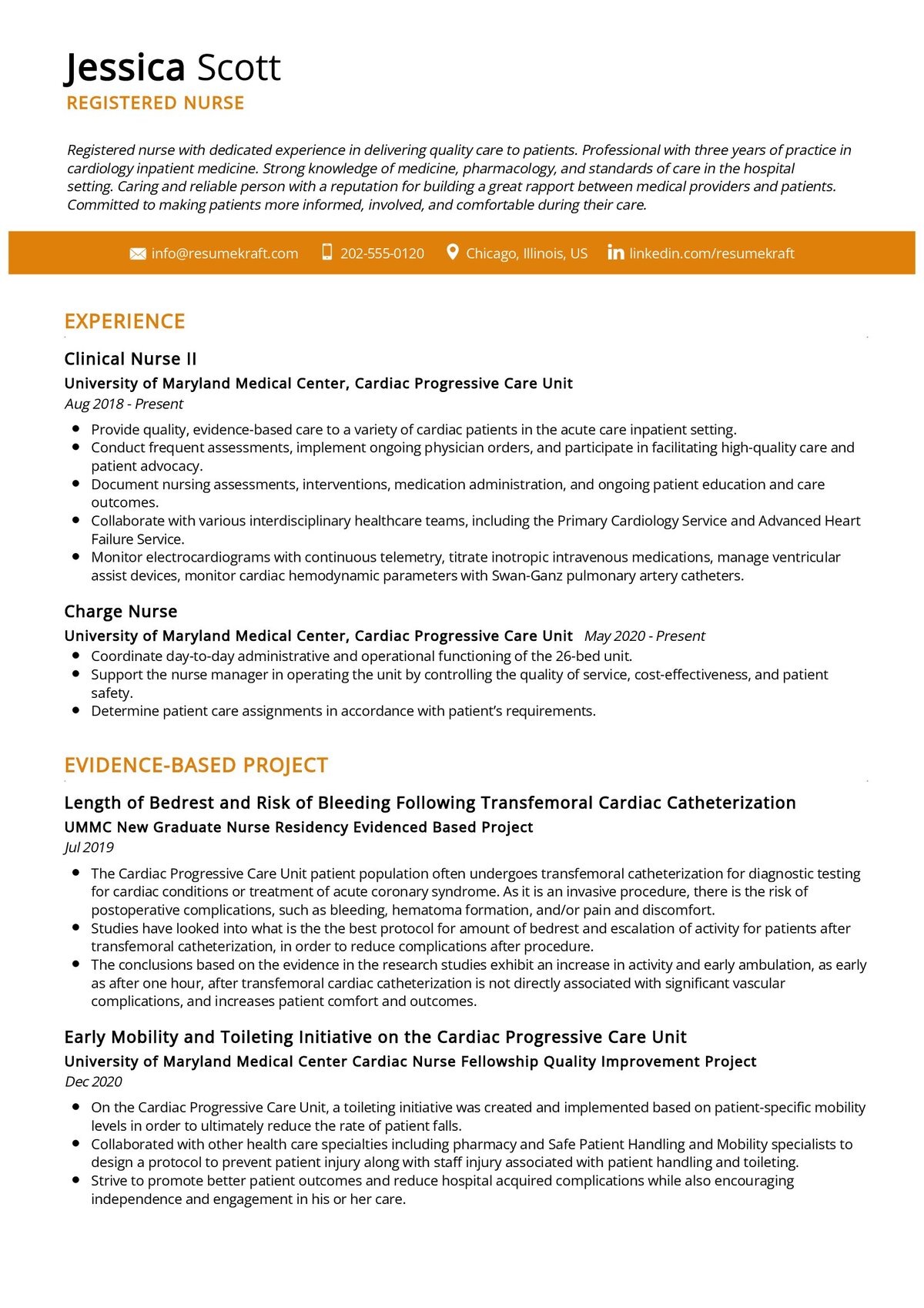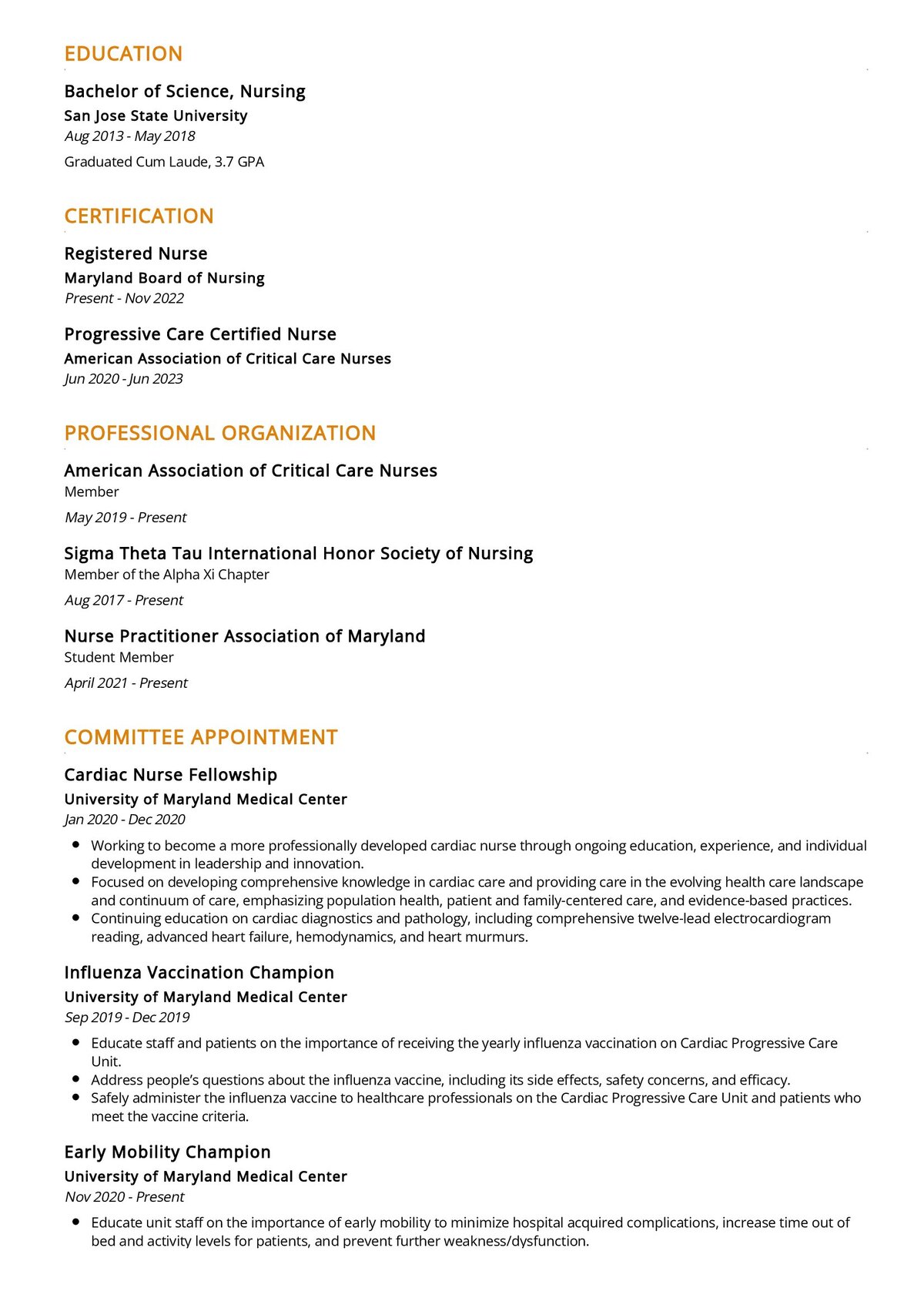What Should Be Included In A Registered Nurse Resume?
A Registered Nurse resume should be tailored to the job you are applying for. It should include essential information such as your education, qualifications and experience. Your resume should also include a list of relevant certifications and any specialized clinical training or experience in your field. Additionally, you should include details of any awards or recognitions you have received in your nursing career. It’s also helpful to include a summary of your skills and strengths, as well as any relevant volunteer or community service experience.
When writing your resume, it’s important to craft a unique document that will tell a compelling story about your capabilities. Tailoring your resume to the exact job you are applying for is important, as it will help to demonstrate to potential employers that you are the right person for the role. Additionally, it’s important to make sure that your resume is well-organized and easy to read. Make sure to use language and formatting that will be easily understood by potential employers.
When writing your resume, it’s important to highlight your skills and experience in a way that will stand out. Use strong action verbs to show the scope of your experience and emphasize your strengths. Additionally, make sure to include any relevant accomplishments or successes that could help to demonstrate your abilities. Finally, make sure to proofread your resume for any spelling or grammar errors and double check the formatting. A well-crafted resume is the best way to show potential employers that you are a qualified candidate for the position.
What Skills Should I Put On My Resume For Registered Nurse?
When writing a resume as a Registered Nurse (RN), it is important to focus on the skills you possess that make you a desirable candidate for the position. This includes both hard and soft skills. Your resume should demonstrate the ability to manage complex medical needs while providing the compassionate care that patients need.
When constructing your resume, make sure to include any certifications or special training you may have. This could include certifications such as ACLS (Advanced Cardiac Life Support) or PALS (Pediatric Advanced Life Support) that you have acquired. Any specialties you possess should also be listed on your resume, such as oncology, geriatric, or pediatric care.
In addition to your hard skills, it is important to include any soft skills you have acquired from working in a team environment. For example, teamwork and communication are essential for working in a hospital setting. You should also include any organizational and time management skills, such as being able to effectively prioritize tasks, manage workflow, and follow patient schedules.
Finally, your resume should also include any awards or accolades you have received. This will help demonstrate your commitment to the nursing profession and the care that you provide.
By highlighting your skills on your resume, you will be able to stand out from the competition and be considered for the position. Make sure to focus on the skills that make you an exceptional candidate, and you will be sure to get the job.
What Is The Job Description Of The Registered Nurse?
The job description of a Registered Nurse is quite varied, and can encompass a range of duties in different health care settings. A Registered Nurse is responsible for delivering safe, quality care to patients in a variety of health care settings. This may include hospitals, nursing homes, assisted living facilities, home health agencies, and other health care settings. Depending on the setting, a Registered Nurse may be required to provide direct patient care, such as administering medications and treatments, monitoring vital signs, and assisting with dressing and bathing.
They may also be required to provide education and support to the patient and their family, as well as providing resources and support to other medical staff. In addition, Registered Nurses may be responsible for developing care plans, supervising other nurses and medical staff, and participating in administrative tasks. Registered Nurses must be able to work in a fast-paced environment, as well as being able to handle the emotional demands of caring for patients. Additionally, they must be able to work with a variety of people, including doctors, nurses, and other medical staff. Registered Nurses must also have excellent communication and organizational skills.
What Is A Good Objective For A Registered Nurse Resume?
As a registered nurse, creating a resume can be a daunting task. Your resume objective is one of the most important parts of your resume, as it helps to set you apart from other job applicants. A good resume objective for a registered nurse should highlight your key skills and experience, and provide a clear indication of what you hope to accomplish as an RN.
When writing your resume objective, focus on qualities that are essential to the role of an RN, such as communication and organizational abilities, as well as the ability to work well under pressure. You should also make sure to include any relevant certifications or experience that you have in the field. Additionally, make sure to state why you are the best candidate for the position and what unique qualifications you possess.
It is also important to keep your resume objective concise and to the point. Your objective should be no longer than three sentences and should be clear and concise. Make sure that your objective is tailored to the role that you are applying for, as a generic objective will not make a great impression. Finally, be sure to include any relevant awards or achievements that you have earned.
By crafting a well-written and tailored resume objective, you can ensure that you will stand out from the competition when applying for a registered nurse position. Take the time to create an objective that highlights your unique skills and experience and make sure to tailor it to the position you are applying for. A great resume objective can make a big difference when it comes to getting the job that you have always wanted.
What Are The Career Prospects In The Registered Nurse?
Registered Nurses have a wide range of career prospects available to them, depending on their credentials, experience, and the type of environment they work in. In the United States, the average salary of a Registered Nurse is just over $95,000 per year, and the projected job growth rate is expected to remain steady through the next decade. Additionally, nurses can specialize in any number of areas, such as geriatrics, pediatrics, oncology, midwifery, or critical care.
Registered nurses have the potential to advance their careers by pursuing higher education, such as a master’s degree or doctoral degree in nursing. With a higher degree, a Registered Nurse can pursue more specialized roles in the field, such as a Nurse Practitioner or a Certified Registered Nurse Anesthetist.
Additionally, Registered Nurses can take advantage of the career ladder system, which allows them to move from lower level positions to higher positions based on their experience and credentials. For example, a Registered Nurse can work their way up to a position of Nurse Manager or Nurse Supervisor.
Finally, Registered Nurses may choose to pursue alternative career paths within the field, such as becoming a health educator, a home health aide, or a nurse consultant. These roles allow nurses to utilize their expertise and experience in different ways, while still working within the field of nursing.
Overall, there is a wide range of career prospects available to Registered Nurses, depending on their individual qualifications and interests. With the right credentials and experience, nurses can pursue a variety of roles, both within and outside of the hospital setting.
Key Takeaways for an Registered Nurse resume
Writing a Registered Nurse resume can be a daunting task. With so much competition in the job market, employers have become increasingly selective in the hiring process. Your resume needs to stand out and make a lasting impression. Here are some key takeaways to keep in mind when writing a Registered Nurse resume:
First, highlight your relevant skills, qualifications, and experience. Prospective employers want to see that you have the necessary knowledge and expertise to carry out the job at hand. Make sure to include any certifications, specializations, and awards you may have.
Second, include a professional summary. This section should succinctly illustrate your value as a Registered Nurse. Employers should quickly be able to understand the value you bring to their organization.
Third, focus on your accomplishments. Don’t forget to include instances where you went above and beyond to make a difference. Employers are looking for candidates who are proactive and can make an immediate impact, so make sure to demonstrate your ability to do this.
Finally, don’t forget to proofread and edit your resume. This is essential for a professional document. Mistakes can be costly and can reflect badly on you.
Following these key takeaways can help make your Registered Nurse resume stand out and give you the best chance of success. With careful crafting and attention to detail, you should be able to create a document that will impress employers and increase your chances of being hired.



